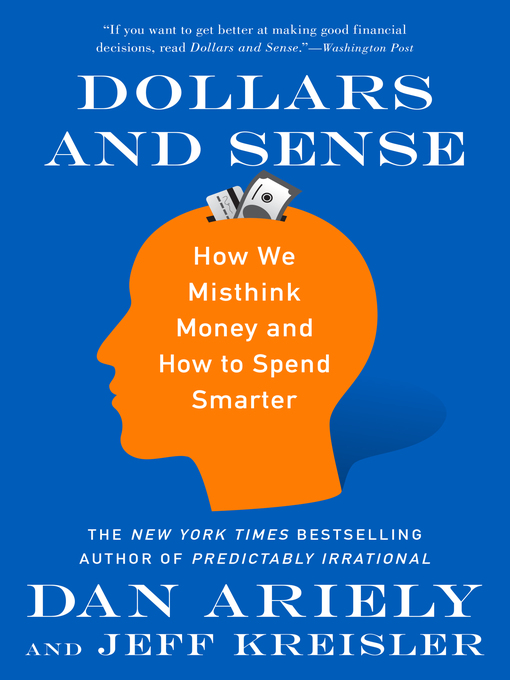
Dollars and Sense
How We Misthink Money and How to Spend Smarter
کتاب های مرتبط
- اطلاعات
- نقد و بررسی
- دیدگاه کاربران
نقد و بررسی

September 18, 2017
Ariely (Payoff), a psychology professor, and Kreisler (Get Rich Cheating), a comedian, zero in on the average person’s relationship to money in this valuable guide. Part one, “What Is Money,” and part two, “How We Assess Value in Ways That Have Little to Do with Value,” describe ways people “misthink money,” even when these ways seem to be rational. Part three, “Put Your Money where Your Mind Is,” offers strategies for coping with our irrationality. Where money is concerned, “what should matter are opportunity costs, the true benefit a purchase provides, and the real pleasure we receive from it compared to other ways we could spend our money.” The authors assert that people “don’t handle in a way that makes sense” but rather “in a way that feels good.” The authors also address the issue of paying on credit, which they say takes away the pain of having to hand over cash and can lead to overspending. Engaging and funny, rife with anecdotes and advice, the book defangs a difficult topic while teaching a lot. Agent: James Levine, Levine Greenberg Literary Agency.

September 15, 2017
A lively look at how even the wisest among us are too often fools eager to part with our money.Most of us think about money at least some portion of each day--how to get more of it, how to spend less of it. However, cautions Ariely (Psychology and Behavioral Economics/Duke Univ.; Payoff: The Hidden Logic That Shapes Our Motivations, 2016, etc.), working with comedian and writer Kreisler (Get Rich Cheating, 2009), "when we bring money into the equation, we make the decisions much more difficult and we open ourselves to mistakes." The better course, they urge, is to consider money not for its own sake--indeed, not to acknowledge its existence at all--but instead to consider the concept of opportunity cost: what do we give up when we make one choice over another? Is the forgone acquisition really the correct one? What if, instead of buying a big-screen TV or new clothes, we thought of what we might do with the hours we don't have to work in order to procure them or of the other things we might buy in their place? Such counsel comes after consideration of other economic notions, such as the endowment effect, whereby we give more significance to things simply because we own them, and our generally risk-averse economic behavior, whereby the pleasure taken in gaining something is vastly overshadowed by the pain caused by losing it. Ariely and Kreisler, writing breezily but meaningfully, allow that money has its uses as a symbolic system of fungible, storable, accessible value. However, the real consideration should always be that "spending money now on one thing is a trade-off for spending it on something else," a calculation that is not often reckoned simply because it's more difficult than fishing out a credit card or some other means of delaying the recognition that spending money now has future, downstream effects. A user-friendly and often entertaining treatise on how to be a more discerning, vastly more aware handler of money.
COPYRIGHT(2017) Kirkus Reviews, ALL RIGHTS RESERVED.

October 15, 2017
In this engaging guide to decision-making about money, author and behavioral economist Ariely (James B. Duke Professor of Psychology & Behavioral Economics, Duke Univ.; Predictably Irrational) and writer and comedian Kreisler (Get Rich Cheating) lay bare the ways monetary value is misunderstood and incorrectly assessed, noting the tendency to "overemphasize irrelevant factors, forget about important ones, and allow insignificant value cues to lead us astray." Through stories, scenarios, and descriptions of experiments conducted by Ariely and others, the authors show the mental "forces at play" in financial psychology, such as why prepaying for a honeymoon may promise a more joyful experience. They also highlight how companies and marketers use these same strategies to induce spending and consider how to design "environments to turn our mental shortcomings into tools that work in the service of our financial success." As the work comes to a close, its attention shifts toward the future, considering suggestions for retirement plans and HR departments and how to "start a conversation" about the "duty of saving," offering a good first step in that direction. VERDICT Highly recommended.--Doug Diesenhaus, Univ. of North Carolina, Chapel Hill
Copyright 2017 Library Journal, LLC Used with permission.

























دیدگاه کاربران